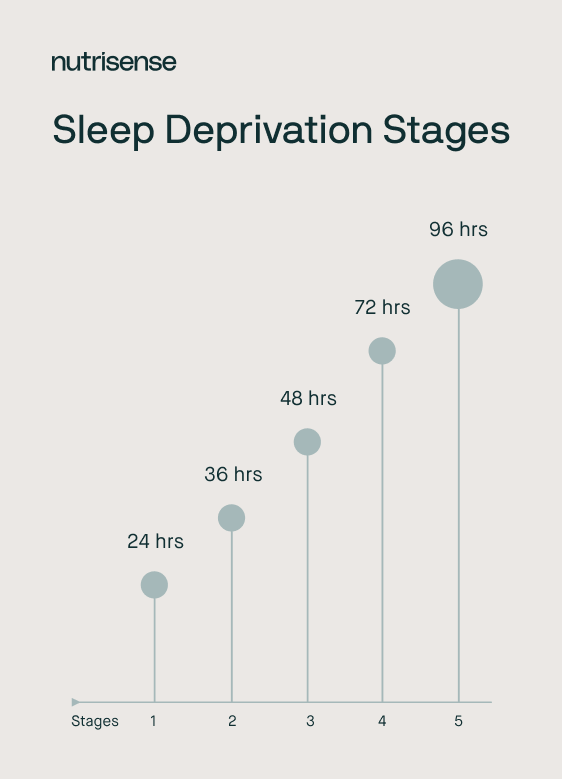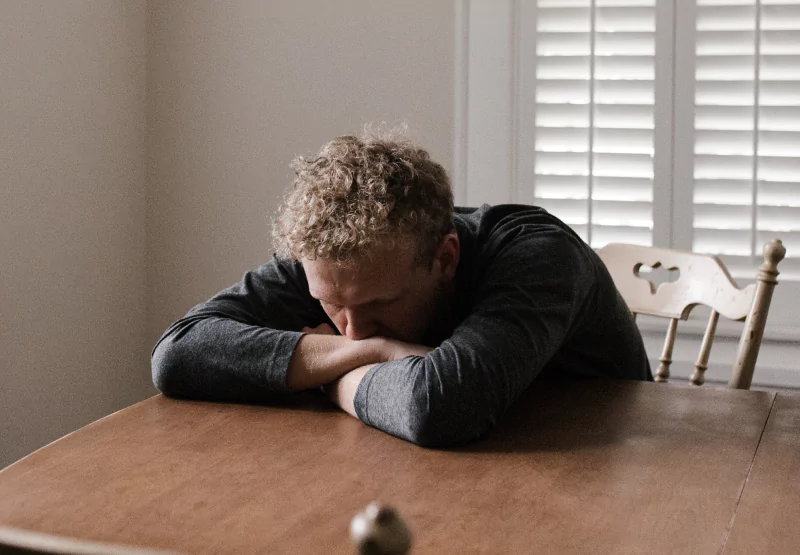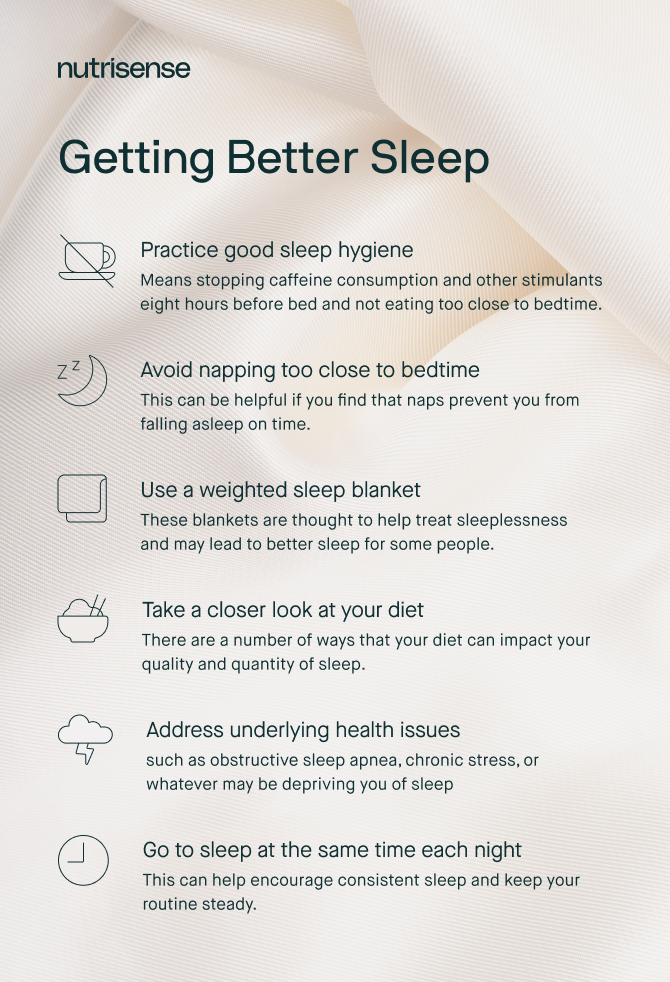Sleep Deprivation Stages: What You Need To Know

Key Takeaways
Did you know that 35.2 percent of all adults in the U.S. report sleeping on average for less than seven hours per night?
A good night’s sleep is essential to maintaining your health and wellbeing. It’s especially when it comes to quality of life, cognitive function, and optimal blood glucose levels.
So what happens when you go long stretches of time without sleeping? Here’s what you need to know if you think you might be suffering from sleep deprivation.
We’ll have a look at:
- The importance of sleep for your health
- The surprising long-term effects of sleep deprivation
- Top tips for better sleep hygiene
Why Is Sleep Important?
Sleep is when your body completes a variety of important functions such as:
- Regulating hunger
- Removing toxins from your brain and other areas of your body
- Deeper repair of tissues and cells
- Modulating stress levels
So what’s the sweet spot when it comes to sleep? According to the CDC, adults should aim to get at least seven hours of sleep per night.
Your sleep habits can have an enormous impact on your immune system, and also affect things like your emotions and decision-making. A lack of sleep can even lead to a higher risk of high blood pressure and heart attack.
Interrupted sleep can lead to a reduced ability to think and remember in healthy individuals. Mental health disorders such as depression and risk-taking behaviors are associated with disrupted sleep, especially in teenagers.
Unfortunately, sleep problems are even more common than you might think. In one sleep study, 23 percent of people reported having trouble staying asleep for five or more nights per week. A lack or proper rest as a result of interrupted sleep or sleep disorders such as sleep apnea can lead to sleep deprivation.
Let’s take a look at some of the negative effects of not getting enough sleep:

- Emotional distress, including an increased risk for depression
- Reduced cognitive function
- Reduced working memory
- Reduced quality of life in those with chronic conditions
- Increased somatic pain in the body
- Increased risk of cardiovascular disease
- Poor metabolic health or increased risk of metabolic syndrome
- Increased risk of certain cancers
What Is Sleep Deprivation And What Causes It?
Sleep deprivation refers to a lack of sufficient sleep during an extended period of time. While pulling an all nighter may be a common occurrence for some people, going too long without sleep can lead to surprising side effects.
Multiple factors can cause sleep deprivation. While the early stages of sleep deprivation may simply lead to a lack of sleep or daytime sleepiness, others can lead to long-term effects on your overall health.
Here are some potential causes of sleep deprivation, which may each be considered different types of stressors:
- Poor sleep hygiene
- Sleep disorders and other sleep problems such as disordered sleep-wake cycle
- Inconsistent sleep schedule
- Dietary factors
- Medication or supplement side-effects
- Hormonal changes or imbalances
- Poor sleep environment
The Stages of Sleep Deprivation

There are marked stages of sleep deprivation that are classified based on how long you’ve gone without adequate sleep. Let’s explore the symptoms of sleep deprivation in each stage and the impact that a lack of sleep can have on your well-being.
Stage 1: 24 Hours
This stage of sleep deprivation is the most common. It begins when you’ve gone at least 24 hours without proper sleep. During this stage you may:
- Feel agitated, irritable, or anxious
- Experience visual distortions
- Have somatosensory changes
According to one sleep study, going 24 hours without sleep can lead to impairments in attention and cognitive performance. The effects of stage one sleep deprivation on psychomotor tasks like reaction time may not be as pronounced as the effects on cognitive performance.
Stage 2: 36 Hours
The second stage of sleep deprivation begins after 36 hours (or a day and a half) without sleep. In this stage:
- Cognitive performance may decline more significantly
- Working memory will start to suffer
- You may experience visual hallucinations
The changes to your mood may be more noticeable in this stage, so you may feel anxiety, feelings of anger, and depersonalization more strongly.
Stage 3: 48 Hours

Stage three of sleep deprivation occurs when you’ve gone at least 48 hours without sleep. Not only will your cognitive performance continue declining in stage three, but you may start to experience feelings of anxiety, euphoria, and dissociation more strongly.
You’re also more likely to start having disordered thinking and complex hallucinations during this stage.
Stage 4: 72 Hours
Stage four of sleep deprivation means you’ve gone 72 hours, or three days, without sleep. In this stage, while other symptoms may subside, you may begin having both visual and auditory hallucinations.
Around the third day without sleep, disordered thoughts and delusions are also common.
Stage 5: More than 96 Hours

Stage five of sleep deprivation is when you’ve gone more than 96 hours, or four days, without adequate sleep. Sleep deprivation to this extent can become very dangerous to your health and produce more severe effects.
For example, going over 96 hours without sleep can lead to acute psychosis or toxic delirium and more severe and widespread changes in metabolic function.
How Does Sleep Deprivation Affect Health?
Over time, inadequate sleep can lead to both long and short-term effects. Here are some most notable short-term effects of sleep deprivation.
Short-Term Effects of Sleep Deprivation

1) Increased Cortisol Levels
One of the short-term effects of sleep deprivation can include an increased cortisol response. This is because Interrupted sleep increases the activity of your sympathetic or “fight or flight” nervous system, which is typically activated in times of stress. The hormonal changes associated with sleep deprivation may also negatively impact glucose homeostasis and reduce insulin sensitivity.
Research shows that this stress to the body is more to do with the disruption of sleep rather than the amount of sleep that was lost.
2) Emotional Distress
Mental health disorders such as depression and risk-taking behaviors have been associated with disrupted sleep, especially in teenagers.
3) Reduced Cognitive Function
Sleep deprivation sleep can lead to a reduced ability to think and remember in healthy individuals. Research specifically shows that sleep deprivation of 24 hours can lead to abnormal CT scan results.
4) Reduced Quality of Life
Poor quality sleep can be a big contributor to sleep deprivation. Studies show that when you are not well-rested, you may experience a reduced quality of life.
This may be especially true in those with chronic conditions. Insufficient sleep may also increase somatic pain throughout the body
Long-Term Effects of Sleep Deprivation
Over time, the short-term effects can lead to chronic sleep deprivation and lead to worse health outcomes and even certain medical conditions.
If you are someone who suffers from chronic sleep deprivation, you may want to consult a healthcare professional for advice on improving your sleep schedule.
Here are some of the longer term effects of chronic sleep deprivation.
1) Increased Risk of Cardiovascular Problems

The constant “fight or flight” stress activation that can result from sleep deprivation creates vasoconstriction (or narrowing of your blood vessels) and a pro-inflammatory state. This can cause an increased risk of issues such as hypertension and other cardiovascular issues like heart disease.
2) Poor Glucose Tolerance
Chronic sleep disruption can lead to sleep deprivation, which can reduce insulin sensitivity. It’s no surprise then that disrupted sleep, in the long run, is associated with type 2 diabetes, dyslipidemia (or poor blood lipid levels), and obesity.
3) Increased Risk of Certain Cancers
Sleep deprivation in the long run can increase your risk of cancer. Some studies suggest that low quality sleep can also lead to colorectal cancer.
One large study found that those who were deprived of sleep through sleep interruption (either from insomnia or obstructive sleep apnea) had an increased risk of breast, nasal, and prostate cancers.
The Stages of Sleep

A healthy sleeping pattern includes one stage of REM sleep and four stages of non-REM sleep. The last two stages of non-REM sleep, called slow wave sleep, are when you experience deep sleep.
These stages need to occur in this correct progression continually for good quality sleep and for your health. If you don’t get quality sleep, the effects of sleep deprivation can begin to present and affect your physical health, as we’ve discussed throughout this article.
Tips to Reduce Sleep Deprivation
How can you address sleep deprivation and get yourself on a path to restful and healthy sleep? Here are a few tips to help you get that beauty sleep and get in tune with your circadian rhythm.

- Practice good sleep hygiene. This means stopping caffeine consumption and other stimulants eight hours before bed and not eating too close to bedtime.
- Avoid napping too close to bedtime. This can be helpful if you find that naps prevent you from falling asleep on time.
- Use a weighted sleep blanket. These blankets are thought to help treat sleeplessness and may lead to better sleep for some people.
- Take a closer look at your diet. There are a number of ways that your diet can impact your quality and quantity of sleep. Consider working one-on-one with a dietitian who can help you identify the best approach for your unique body.
- Address underlying health issues. These may include obstructive sleep apnea, chronic stress, or whatever may be depriving you of sleep.
- Go to sleep at the same time each night. This can help encourage consistent sleep and keep your routine steady.
Find the right Nutrisense programto turn insight into progress.
Go Beyond Glucose Data with Nutrisense
Your glucose can significantly impact how your body feels and functions. That’s why stable levels are an important factor in supporting overall wellbeing. But viewing glucose isn't enough. Nutrisense, you’ll be able to learn how to use your body's data to make informed lifestyle choices that support healthy living.
One-to-one coaching
Sign up to access insurance-covered video calls to work with a glucose expert: a personal registered dietitian or certified nutritionist who will help tailor your lifestyle and diet to your goals.
Monitor and measure what matters
With the Nutrisense CGM Program, you can monitor your glucose with health tech like glucose biosensors and continuous glucose monitor (CGM)s, and analyze the trends over time with the Nutrisense App. This will help you make the most informed choices about the foods you consume and their impact on your health.
Find your best fit
Ready to take the first step? Start with our quiz to find the right Nutrisense program to help you take control.

Heather is a Registered and Licensed Dietitian Nutritionist (RDN, LDN), subject matter expert, and technical writer, with a master's degree in nutrition science from Bastyr University. She has a specialty in neuroendocrinology and has been working in the field of nutrition—including nutrition research, education, medical writing, and clinical integrative and functional nutrition—for over 15 years.




